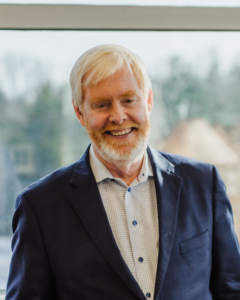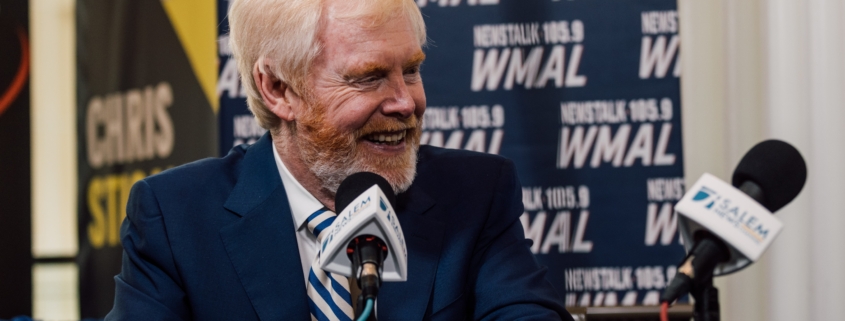Conservative Leader Prepared at Faithful Catholic College
“When you look at society today, it is a direct result of secularism being taught as a religion,” says L. Brent Bozell III, who is founder and president of the Media Research Center, the largest media watchdog organization in the United States.
“And I think that if everyone were taught in a genuine Catholic school, all of the world’s problems would go away,” Bozell continued.
The Cardinal Newman Society recently caught up with Bozell, who formerly served on the CNS board of directors, to discuss the impact of the education he received at the University of Dallas in Irving, Tex., which is recognized in The Newman Guide for its strong Catholic identity.
“Had it not been for the University of Dallas, I don’t know if I would have been able to pursue my career as I did. The closer you can be to understanding black and white, you are better prepared for life. It’s the secular grey area that can make life very confusing,” said Bozell.

L. Brent Bozell III
CNS: Why did you choose to attend the University of Dallas? What was your experience like?
Mr. Bozell: It was because of a long family association with Dr. Frederick (“Fritz”) Wilhelmsen, who was the director of theology at the university. He was a family friend, but also an editor at Triumph magazine, which my father started.
CNS: How did your education prepare you for your career and vocation?
Mr. Bozell: Fritz Wilhelmsen’s daughter, Alexandra Wilhelmsen, was my advisor when I declared my history major. I remember her asking me what I intended to do with it. I remember telling her I had no idea, at which point she burst out laughing and told me I would make a fine history major; the point being, unless you’re going to teach it, or write about it, you really can’t apply it, other than giving you a broad cultural understanding of the world.
CNS: How did attending a faithful Catholic college help you grow in your faith? How did it help you grow as a person?
Mr. Bozell: I don’t know that I was the most faithful Catholic in college, but I suspect that’s what 99 percent of Catholics in college would tell you. But you were surrounded by Catholicism at the University of Dallas, and they gave it—along with my family’s structure—great direction as I embarked on my career.
CNS: How has the education you received influenced your work?
Mr. Bozell: Had it not been for the University of Dallas, I don’t know if I would have been able to pursue my career as I did. The closer you can be to understanding black and white, you are better prepared for life. It’s the secular grey area that can make life very confusing.
CNS: From the classes to dorm life to student activities, what had the most impact on you during college?
Mr. Bozell: The friendships I made that I still have to this day. And that’s 50 years later (since I began at the University of Dallas). And that includes my wife—I still have her, too!
CNS: How were you formed mentally, spiritually, and physically by your faithful Catholic college?
Mr. Bozell: Mentally: the education was second to none; I wish only that I had taken greater advantage of it. Spiritually: Catholicism was not just taught; it was lived, which distinguishes it from most Catholic colleges. Physically, I broke every bone in my body due to bad luck growing up, so that didn’t help!
CNS: Why do you think faithful Catholic education is important?
Mr. Bozell: When you look at society today, it is a direct result of secularism being taught as a religion. And I think that if everyone were taught in a genuine Catholic school, all of the world’s problems would go away.
CNS: Do you think the liberal arts are valuable? Was studying the liberal arts helpful to you after graduation?
Mr. Bozell: I think it’s tragic when I hear of colleges cutting them back or cutting them out—they say that “it is not a career path!” The liberal arts may not train you how to use a wrench, but they train you how to use your mind.
CNS: Do you have any special memories from college?
Mr. Bozell: Yes, but I can’t tell you any of them! You know, they would revolve around times spent with fellow students who would become lifelong friends. But also, time spent with professors who were truly iconic—not just at the University of Dallas, but in their fields! You knew in their company that so many of them were genuine Catholic educators both inside and outside of the classroom.
CNS: After studying the liberal arts in college, how did you make the transition to employment?
Mr. Bozell: Well, I went from college directly into the career path I am now; I went directly into politics. My first job was working for a fellow who was a deeply spiritual Catholic, a conservative Catholic.
CNS: What have been some of the most exciting projects to be a part of at your current job?
Mr. Bozell: The Media Research Center is alone in the field of public policy, in that it is the only organization in the entirety of the conservative movement that is focused entirely on what I believe to be the greatest enemy of the conservative movement: the Left within the news media. This has been an exciting time over the last 35 years.
CNS: What advice would you give to students who are navigating the college search?
Mr. Bozell: Follow the Newman Guide is what I would say! There are Catholic colleges that are Catholic in name only, but a few that live their Catholicism. And Newman Guide colleges are where every Catholic should consider going. This is not to say that only Catholic schools offer a good education; however, when you have a school like the University of Dallas, you can’t go wrong.
CNS: What do you think was key to helping form you into the leader you are today?
Mr. Bozell: I think, a well-rounded understanding of the world. And also, focusing more on conviction than on consensus.

